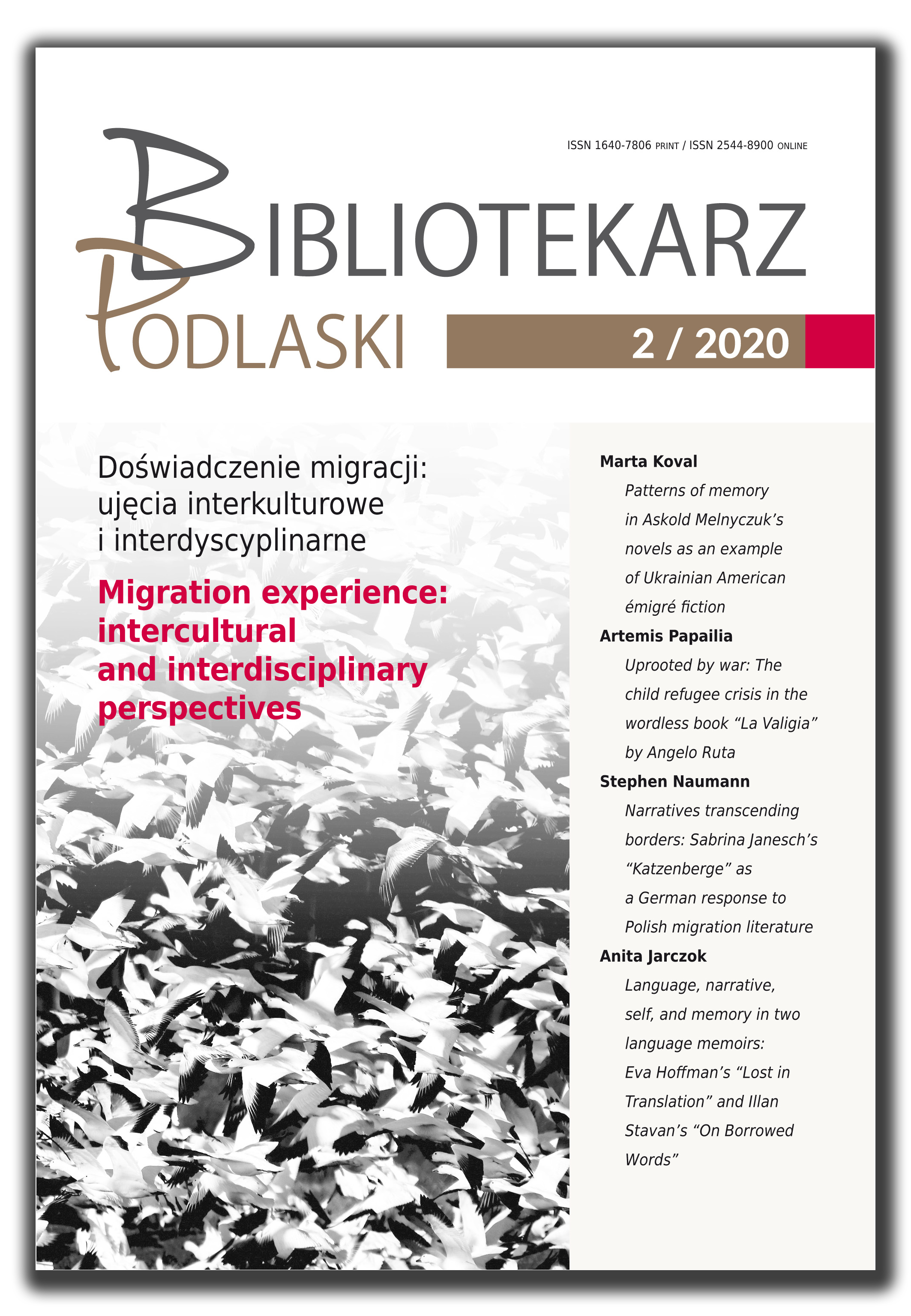Abstract
The aticle deals with the peculiarity of the literary representation of multiculturalism and the borderland in creative work by Czesław Miłosz. The factors which influenced the development of Milosz’s poetry are revealed, the life of the author in Wilno in the inter-war period is considered, and the romantic tradition of Adam Mizkiewicz is outlined. The cultural and political events which were reflected in the legacy of Miłosz are examined; the period of emigration and the homecoming are studied. The cultural and national specificity of the borderland, which affected the creative writing of Miłosz, is depicted, and distinct ethnic and cultural models, images and symbols in the author’s ideological and artistic inquiries are analyzed.
References
Britanishsky, V. (1991). Vvedenie v Milosza. Voprosy Literatury, 6, 109-133.
Głogowska, H. (2012). Bezdomność prawdy – o białoruskich motywach w twórczości Czesława Miłosza. In A. Janicka, K. Korotkich, & J. Ławski (Eds.), Pogranicza, cezury, zmierzchy Czesława Miłosza (pp. 215-229). Warszawa: Narodowe Centrum Kultury; Białystok: Zakład Badań Interdyscyplinarnych i Porównawczych “Wschód – Zachód”. Wydział Filologiczny Uniwersytetu w Białymstoku.
Miłosz, Cz. (1984). Nieobjęta ziemia. Paryż.
Miłosz, Cz. (1989). Zniewolony umysł. Kraków: Krajowa Agencja Wydawnicza.
Miłosz, Cz. (1991). Czy będzie powieść? Tygodnik Powszechny, 37, 5-9.
Miłosz, Cz. (1991). Рoszukiwanie Ojczyzny. Kraków.
Miłosz, Cz. (1993). Historia literatury polskiej (do roku 1939). Kraków: Znak.
Miłosz, Cz. (1994). Wiersze wybrane. Warszawa.
Miłosz, Cz. (2000). Wyprawa w dwudziestolecie. Kraków: Wydawnictwo Literackie.
Miłosz, Cz. (2001). Тo. Kraków: Znak.
Miłosz, Cz. (2002). Druga przestrzeń. Kraków: Znak.
Miłosz, Cz. (1931). Jeszcze wiersz o ojczyźnie. Żagary, 2.
Miłosz, Cz. (1990). Rodzinna Europa. Warszawa: Wydawnictwo Czytelnik.
Milosz, Cz. & Fiut, A. (1994). Czesława Miłosza autoportret przekorny. Rozmowy przeprowadził A. Fuit. Kraków: Wydawnictwo Literackie.
Musijenko, S. (2014). Mała ojczyzna w twórczości Czesława Miłosza. In S. Gajda & I. Jokiel (Eds.), Polonistyka wobec wyzwań współczesności : V Kongres Polonistyki Zagranicznej, Brzeg – Opole, 10-13 lipca 2012 r. T. 1 (pp. 667-679). Opole: Wydawnictwo Uniwersytetu Opolskiego.
Articles published in the “gold open access” mode on the basis of a non-exclusive license agreement between the publisher and the author. Permitted use:
- the publication may be read and stored on any device,
- the publication may be cited (with obligatory reference to the author, the title of the text, as well as the full title, bibliographic address of the issue and page of the journal)
The editorial team of “Bibliotekarz Podlaski” implements an open access policy by publishing materials in the form of the so-called Gold Open Access. From volume 42 (issue 1/2019), the journal is available under the Creative Commons license (Attribution – ShareAlike: CC BY-SA).
The key declarations of the Open Access and Open Science movement, which we fully support, are available on the CEON Open Science website.
COPYRIGHT:
The editorial team of “Bibliotekarz Podlaski” implements an open access policy by publishing materials in the form of the so-called Gold Open Access. The journal is available under the Creative Commons license – Attribution – ShareAlike 4.0: International: CC BY-SA 4.0).
The key declarations of the Open Access and Open Science movement, which we fully support, are available on the CEON Open Science website.
“Bibliotekarz Podlaski” allows its readers to read, download, copy, distribute, print, search and link to the full content of articles. We enable full, immediate, unlimited (both in a territorial, temporal and technical sense) open access to all published content, in accordance with the principle that freely available research increases and accelerates the global development of science and the exchange of knowledge.
The editorial team of “Bibliotekarz Podlaski” encourages authors to place articles published in the journal in open repositories (after the review or the final version of the publisher), provided that a link to the journal’s website is provided.
The journal does not charge the authors any fees for accepting and publishing their texts.


